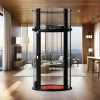With an abundance of types and styles of home elevators out there with differing installation costs, technology and price points, knowing where to start your search may seem like a big task. Luckily, we did the hard work for you. Our company’s in-depth study of home elevators focuses on the average person and what is really important to them.
Types of Home Elevators
There is a lot to choose from when searching for the perfect elevator. How the elevator cabin raises and lowers or what is called the drive system, defines the types of home elevators available today. Traction Electric (MRL) elevators are most often the most expensive while pneumatic elevators are the least costly. hydraulic elevators fall into the midrange cost.
There are three basic types :
There is a wide variety of home elevator styles available in varying sizes regardless of the drive system. From compact elevators designed to fit in spaces as small as a closet to larger models that can accommodate a wheelchair, elevators can now be a discreet part of your beautiful home, or they can be a focal point that enhances your décor.
|
Type of Home Elevator |
Best For |
|
Traction (MRL) Elevators |
New construction, durability and existing homes |
|
Hydraulic Elevators |
Saving space |
|
Pneumatic Elevators |
Existing and least expensive. |
How much do home elevators cost?
There are a lot of variables to consider in home elevator options and installation that giving even a ballpark estimate is impossible. Your best option is to decide how many floors it needs to travel between and what size home elevator you need, then get estimates based on those factors from home elevator companies like the ones that can be found featured in the following guide.
Are home elevators safe?
Home elevators have very tough safety standards that must be met by the EN81 Standard . Elevators installed at home must also meet state and local code requirements and pass those inspections.
How fast do home elevators move?
A home elevator’s average speed is 0.30 Meters per Second.
What defines the difference between commercial and residential elevators?
Home elevators are not subject to the equivalent size and weight requirements that commercial elevators are required by the EN81 Standard. However, the same safety features found in commercial elevators can be found equipped on home elevators.
Conclusion
If mobility is an issue that cannot be ignored for you or a loved one and stairs at home are slowly becoming a safety hazard, a home elevator is a very suitable option. There are a lot of choices in types, styles, and financing today than there has ever been before to make finding a home elevator easier when you consider your needs, home design and your budget.








